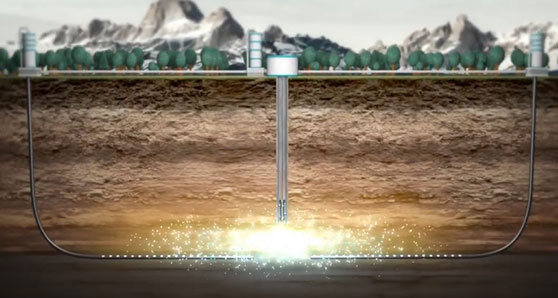 The idea for Calgary-based Proton Technologies began as a conversation between leading academic researchers at the University of Calgary and a young Canadian oil and gas company.
The idea for Calgary-based Proton Technologies began as a conversation between leading academic researchers at the University of Calgary and a young Canadian oil and gas company.
Both were seeking to redefine the energy sector through the application of game-changing technologies.
Proton’s mission is to transform the deep earth into a continuing source of green energy, and help usher in a new era for cities and industry worldwide.
Grant Strem, chairman and CEO of Proton Technologies, said the company found a way to make extremely low-cost hydrogen from oilfields “in a way that we can leave all the emissions and carbon in the ground and extract only pure hydrogen.”
“I think that’s transformative for energy because a lot of people are looking for ways to de-carbonize energy and I think a lot of people have talked about the hydrogen economy for decades really. Now all the technology pieces are there. The missing ingredient is low-cost hydrogen. So now we can step in and fill that gap,” said Strem.
“We’ve only done it on a small scale so far but are planning to scale up in our next steps. One of my old professors and I came up with the idea. It seemed like a straightforward enough idea and we were very surprised that it wasn’t already an industrial process.
“It’s actually two very old processes combined in a new way. One of them is a process for warming an oilfield by injecting oxygen. That oxidizes the oil, releases some heat in the ground and this is a century-old concept, to try to warm up the oil so it flows better to the oil wells. That’s been done about 500 times worldwide but one thing most people didn’t notice, or didn’t care about, was that every single one of them created hydrogen as part of the process.
“Everyone’s focus was on the oil. It wasn’t on the hydrogen. I thought: Well maybe there’s a way to capture just the hydrogen so the simple concept is to install and use a membrane that only hydrogen can get through and you can pull that up to the surface and leave everything else in the ground.”
Strem said this discovery means the cost of energy can drop and old oilfields can now have value.
“Even old unswept reserves. So abandonment liabilities are postponed and existing assets can really provide a significant amount of clean energy for us. The big driver is our expectation – we can produce hydrogen for a fraction of the cost of diesel and gasoline.
“So long-term, it’s not just existing uses for hydrogen like making fertilizer or upgrading oil. It’s actually going to be a transportation fuel, a heating fuel. It can be used in lots of places that today we use hydrocarbons. People will go that way I think because the cost can be much lower.”
A small-scale demonstration of the project was done last year on an oilfield in Saskatchewan. Now the plan is to scale up and start selling significant volumes of hydrogen.
The views, opinions and positions expressed by columnists and contributors are the author’s alone. They do not inherently or expressly reflect the views, opinions and/or positions of our publication.



